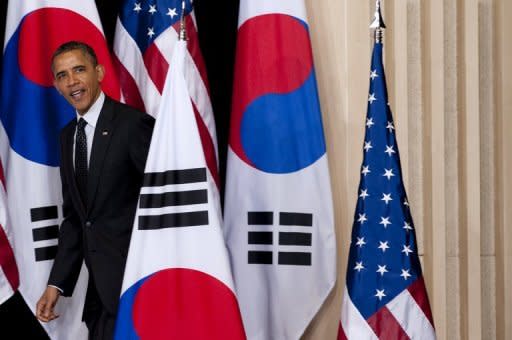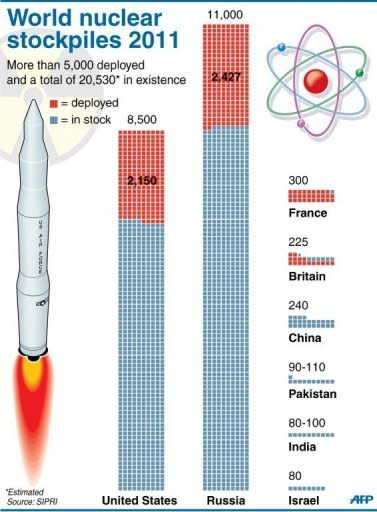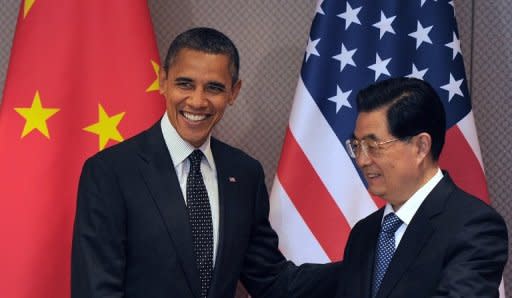Obama pledges nuclear cuts, warns N. Korea and Iran
President Barack Obama said Monday the United States would further cut its own nuclear stockpiles, as he warned North Korea and Iran to back down over their atomic plans. Obama delivered a hard-hitting address in Seoul before a nuclear security summit opened, seeking to build global momentum in the drive to eliminate or safeguard material that could be used to make thousands of bombs. He said major progress had been made since the initiative was launched two years ago, citing a number of countries that had removed their stockpiles and forecasting more commitments from other nations during the two-day summit. "But we're under no illusions. We know that nuclear material -- enough for many weapons -- is still being stored without adequate protection," he said. "We know that terrorists and criminal gangs are still trying to get their hands on it, as well as the radioactive material for a dirty bomb... the danger of nuclear terrorism remains one of the greatest threats to global security." Obama urged the leaders or top officials from 53 nations gathered in Seoul for the summit to "keep at it", and pledged further actions from the United States including efforts with Russia to jointly cut their stockpiles. He said that, with more than 1,500 deployed nuclear weapons and 5,000 warheads, the United States had "more nuclear weapons than we need". "I firmly believe that we can ensure the security of the United States and our allies, maintain a strong deterrent against any threat, and still pursue further reductions in our nuclear arsenal," he said. The atomic programmes of North Korea and Iran were a key topic on the sidelines of the summit, although not officially on the agenda. In North Asia, tensions have escalated in recent weeks after North Korea announced it would launch a long-range rocket in mid-April. The United States, South Korea and many other countries believe the launch is intended to test a missile capable eventually of delivering an atomic warhead. Obama again told North Korea on Monday to abandon its nuclear ambitions, warning its erratic and provocative behaviour would not be rewarded. "By now it should be clear, your provocations and pursuit of nuclear weapons have not achieved the security you seek, they have undermined it," he said, in what he called a direct address to the North's new leadership. "And know this -- there will be no more rewards for provocations. Those days are over. This is the choice before you. This is the decision you must make." The nuclear-armed North insists its rocket launch will merely put a peaceful satellite into orbit. South Korea announced Monday it would shoot down the North's rocket if it strayed into the South's territory. Japan said last week it would do the same. Obama also warned Iran in his speech that time was running out to resolve the stand-off over its nuclear programme through diplomacy. "There is time to solve this diplomatically... but time is short. Iran must act with the seriousness and sense of urgency that this moment demands," he said. Obama met separately with Chinese President Hu Jintao and Russian President Dmitry Medvedev ahead of the start of the summit Monday evening. Experts have acknowledged major progress on safeguarding nuclear materials since the first atomic security summit in Washington two years ago. They point to former Soviet republic Kazakhstan securing over 13 tonnes of highly enriched uranium (HEU) and plutonium since then, while Chile eliminated its entire HEU stockpile. Obama also said Monday that all HEU had been removed from Ukraine, and said other nations would report at the Seoul summit fresh commitments to secure or remove nuclear materials. Following the Washington summit, the United States and Russia signed a protocol under which each would dispose of 34 tonnes of plutonium -- enough for 17,000 nuclear weapons. Obama said the United States would also seek talks with Russia on a new step -- reducing not only strategic nuclear warheads, but also tactical weapons meant for use on the battlefield and warheads in reserve. He said he would discuss the issue with Russia's incoming President Vladimir Putin when they meet in May.





